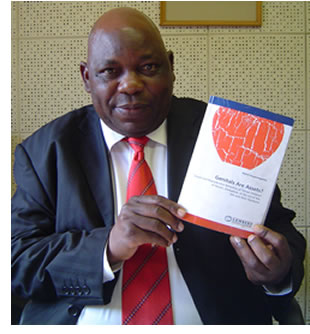| |
Back to Index
Understanding
the private lives of 'street children': Interview with Dr Watch
Ruparanganda
Upenyu
Makoni-Muchemwa, Kubatana.net
July 14, 2011
 View audio file details
View audio file details
 Dr
Ruparanganda spent 15 months researching the lives and sexualities
of street dwelling children and young adults, culminating in his
study titled Genitals
are Assests? Sexual and Reproductive Behaviors of "Street Children"
of Harare, Zimbabwe, in the era of the HIV and AIDS Pandemic
(Lambert Academic Publishers). As a result of his experiences Dr
Ruparanganda has become a staunch advocate for the rights of street
dwellers. Dr
Ruparanganda spent 15 months researching the lives and sexualities
of street dwelling children and young adults, culminating in his
study titled Genitals
are Assests? Sexual and Reproductive Behaviors of "Street Children"
of Harare, Zimbabwe, in the era of the HIV and AIDS Pandemic
(Lambert Academic Publishers). As a result of his experiences Dr
Ruparanganda has become a staunch advocate for the rights of street
dwellers.
What
prompted you to undertake this study?
Previous studies had only scratched the surface and focussed on
issues of scavenging, the attitudes of these children and those
of society. I felt there was a need to really go into the world
of these children and youths and try to understand them from within.
I wanted to go into their private lives on the streets. Also I had
realised that most of the NGOs dealing with children in Harare had
failed to get out of the mode of operation of only thinking about
small children, not realising that the problem was quite huge. These
children were becoming adults and having children on the streets.
Most of these NGOs are still operating the same way they used to
operate in the 80s, and yet we can now talk of a street community,
a constituency. We can talk of a quasi tribe; they have their own
subculture and even language. You can see that they lead their own
life on the streets, although you find that their behaviour patterns
and attitudes towards life also reflect what is happening in mainstream
society. Especially when you look at gender relations, boys want
to behave like men in mainstream society objectifying women and
girls on the streets, and also mystifying their activities as part
of their constructions of masculinity.
 Listen
Listen
What
aspects of their subculture did you find most interesting?
You find the language they use, because of the attitude of mainstream
society, of condemning them and marginalising them, they have developed
a language to hit back at society. They have what we call street
lingo, like when they are talking of STIs, they call it sko'ngo.
It took me time to understand these children when they were talking
amongst themselves. When they are referring to masturbation, which
is quite prevalent, they call it gwetengwe. They have codes they
use to communicate even about security issues. When they are referring
to Remand Prison, it is called Reeds. I discovered that what we,
as mainstream society, consider to be unacceptable, they consider
it acceptable like foul language, stealing, snatching things. It's
part of their livelihood.
Would
you say that this is a sub-culture that has arisen in reaction to
mainstream society?
They are reacting to the negative attitude and hatred by mainstream
society. Yet the street does not become pregnant. The street does
not bear children. It's like society shooting itself in the
foot. It has neglected part of itself.
What
are the origins of street dwelling in Zimbabwe?
I deliberately went into the socio-historical context of the phenomena.
You find that in pre-colonial traditional communities, the extended
family systems were intact. There was no visible orphan hood. I
am reminded of Hard Times where Charles Dickens describes the difficulties
faced by children during the early years of the industrial revolution.
The same happened and is continuing to happen in Zimbabwe. Where
you now find that because of urbanisation and industrialisation
all these problems are attributable to modernity, colonisation,
independence; they are continuities rather than discontinuities.
The spirit of ubuntu has been blocked. You don't care about
the next person and how they are surviving; this is how we get children
on the streets. People have now become individualistic because of
the new way of life. People no longer bother about their own kin
who are in the rural areas. This is an irreversible process.  Listen
Listen
Do you
think Zimbabwean society is evolving in a way that will be able
to meet those deficiencies?
At the moment it's difficult to say, especially when one looks
at the performance of our economy. [Government] can't intervene
meaningfully to assist street children. This is why we have found
other arms of the government coming in to use a punitive approach
of harassing and abusing these children. This is a human rights
issue because Zimbabwe is a signatory to the rights of the child.
It makes me angry. I get emotional when young children get harassed.
They are loaded onto lorries and dumped hundreds of kilometres away
and they have to walk back. It has been happening since the mid
80s. International organisations are here, like Save the Children,
but which children are they saving? We have so many organisations
purporting to be for children, but when you go to the streets and
you live there like I did for more than fifteen months, you don't
see any officer from any of those organisations. We talk of HIV/AIDs,
we talk of STIs; the girl child on the streets is being abused and
no one bothers.  Listen
Listen
Visit the Kubatana.net
fact
sheet
 Audio File
Audio File
Please credit www.kubatana.net if you make use of material from this website.
This work is licensed under a Creative Commons License unless stated otherwise.
TOP
|

